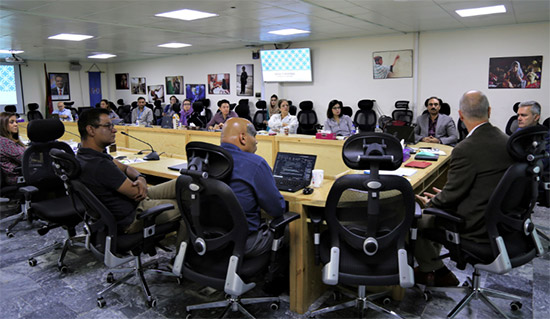
14 October 2020: A multidisciplinary team from WHO’s Regional Office for the Eastern Mediterranean has concluded a mission to Afghanistan to review the ongoing response to COVID-19, identify gaps and potential risks, and provide recommendations for strengthening response and control measures.
Despite insecurity, natural disasters and other ongoing challenges, the Government of Afghanistan has shown commitment to prioritize and address the COVID-19 epidemic from the very beginning of the crisis.
WHO Afghanistan has been supporting Afghanistan’s Ministry of Public Health in responding to the COVID-19 emergency since January 2020. This support has been focused on nine pillars, guided by the COVID-19 ONE UN Health Response Plan.
“Afghanistan has made significant strides in containing the pandemic. After reaching a peak in cases in May/June, there has been a continuous decline in the number of cases in recent weeks,” said Richard Brennan, Regional Emergency Director and mission team lead.
“Extensive training has taken place for health workers on a range of topics. Progress has also been made to rapidly scale up the number of laboratories that are able to test for COVID-19, with 14 public and 18 private laboratories in 8 provinces currently active, and plans to expand to 34 provinces.”
There were no COVID-19 testing facilities when the epidemic started in Afghanistan. WHO has since supported the Ministry of Public Health in a rapid scale-up by establishing laboratories, training technical staff, and providing essential equipment and supplies to expand testing across the country. Given this support, the current network of laboratories can conduct up to 5500 test per day, but more needs to be done.
Extensive investment has also been made in the provision of infection prevention and control (IPC) training. More than 2000 health care workers have been trained on case management and intensive care and while more than 1300 have received training on IPC through WHO’s support. Technical support in the development of national IPC guidelines is also ongoing.
“We see a need for a more institutionalized approach to protecting health care workers through improved infection prevention and control measures, especially in light of the infections occurring in health care settings. Timely and comprehensive data-sharing is also important to allow us to better analyze the course of the pandemic and provide appropriate guidance and support to further contain transmission.”
Surveillance and contact tracing has significantly benefited from the country’s functioning disease early warning system and the polio programme’s extensive surveillance network which has been leveraged to support the response to COVID-19. To date, the polio programme has facilitated COVID-19 surveillance training for more than 98 000 health service providers (public and private), more than 47 000 polio frontline workers, nearly 36 000 members of the Polio Surveillance Network, and about 5000 government and NGO staff. However, community-based and event-based surveillance requires strengthening, and the capacity of rapid response teams remains limited even though nearly 240 have been trained on case definition, specimen collection and case investigation.
While an appropriate testing strategy is in place, the COVID-19 national laboratory network can be further strengthened by assessing laboratory capacities using WHO’s COVID-19 Laboratory Assessment Tool.
A strategic vision for risk communication and community engagement (RCCE) with an innovative approach and road map that embraces community engagement and accountability has been developed for inclusion in the existing national action plan. A comprehensive RCCE package has been finalized, including a series of well-planned Afghanistan-specific training modules targeting frontline health workers and key staff in municipalities and community development councils. WHO is co-chairing an interagency RCCE working group which is providing a collaborative platform to align messaging, coordinate tasks to avoid duplication and share lessons learnt. A functional rumour tracking system is also in place in the country, although a more systematic approach is needed to guide and inform public message development.
With the return of more than 550 000 Afghans from the Islamic Republic of Iran and Pakistan, and several porous border crossings between these countries and Afghanistan, greater effort needs to be placed on increasing cross-border collaboration between these countries to manage COVID-19, as well as other public health risks that can threaten national and regional health security.


